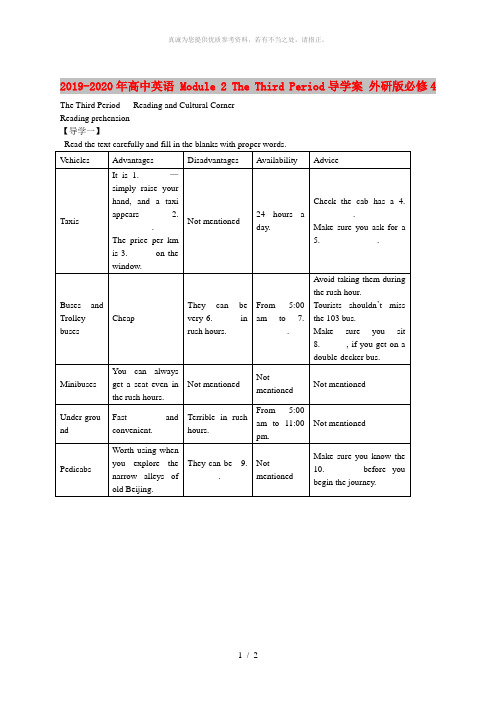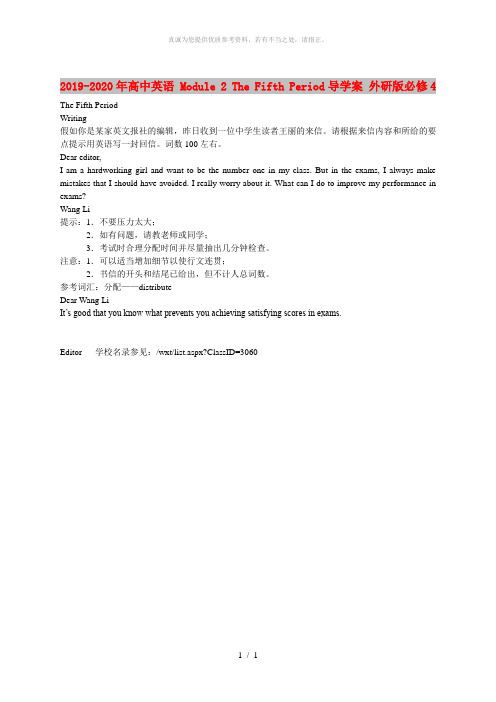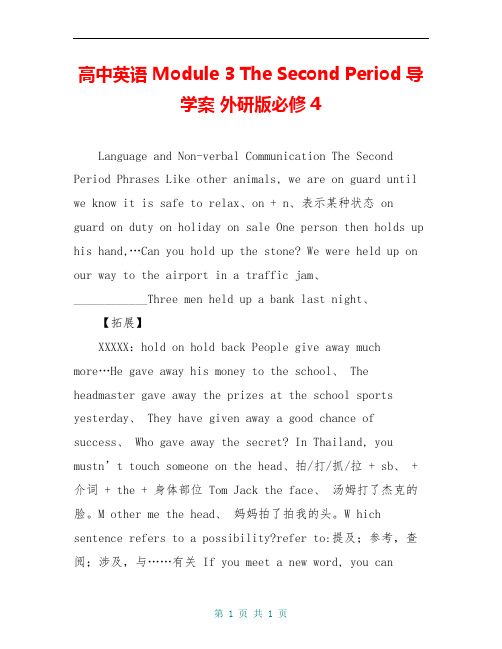高中英语 Module 2 The Fourth Period导学案 外研版必修4
2019-2020年高中英语 Module 2 The Third Period导学案 外研版必修4

2019-2020年高中英语 Module 2 The Third Period导学案外研版必修4The Third Period Reading and Cultural CornerReading prehension【导学一】【导学二】Read the text and decide whether the following statement is T or F.1. The taxi driver will tell you the price when you get into the taxi. ( )2. Buses and trolleybuses are usually very crowded at 7: 00 pm in Beijing. ( )3. If you sit upstairs on a double-decker bus, you will have a good view of Beijing. ( )4. A minibus is more crowded than an ordinary bus. ( )5. The underground in Beijing is open for twelve hours a day. ( )6. Pedicabs are most convenient transport to get around in Beijing. ( )Cultural CornerRead and answer the questions.1. What is a congestion charge?__________________________________________________________________.2. Why are there traffic jams in London?_________________________________________________________________.3. What are people’s attitude s towards this policy?_________________________________________________________________.【短文改错】Dear Lu Ting,I’m quite familiar your situation. As puters bee more and more popular, some student cannot help playing online games and chatting. It was not only a problem of waste time, but a seriously problem for their future! What you should do first is to find out what make them addicted to the puter games. Lack of love from their parents? Poor scores? Then having a heart-to-heart talk with them. Secondly, you should help them with his study to build up their confidence and make them interested in. Thirdly, find something else, not the games, for them to do instead of.Yours,Toni。
2019-2020年高中英语 Module 2 The Fifth Period导学案 外研版必修4

真诚为您提供优质参考资料,若有不当之处,请指正。
2019-2020年高中英语 Module 2 The Fifth Period导学案外研版必修4
The Fifth Period
Writing
假如你是某家英文报社的编辑,昨日收到一位中学生读者王丽的来信。
请根据来信内容和所给的要点提示用英语写一封回信。
词数100左右。
Dear editor,
I am a hardworking girl and want to be the number one in my class. But in the exams, I always make mistakes that I should have avoided. I really worry about it. What can I do to improve my performance in exams?
Wang Li
提示:1.不要压力太大;
2.如有问题,请教老师或同学;
3.考试时合理分配时间并尽量抽出几分钟检查。
注意:1.可以适当增加细节以使行文连贯;
2.书信的开头和结尾已给出,但不计人总词数。
参考词汇:分配——distribute
Dear Wang Li
It’s good that you know what prevents you achieving satisfying scores in exams.
Editor 学校名录参见:/wxt/list.aspx?ClassID=3060
1 / 1。
外研版高中英语必修1全册教学导学案

外研版高中英语必修1全册教学导学案目录Module 1 My First Day at Senior High Period one学案 (2)Module 1 My First Day at Senior High Period two学案 (5)Module 1 My First Day at Senior High Period three学案 (7)Module 1 My First Day at Senior High Period four学案 (11)Module 2 My New Teachers Period one学案 (13)Module 2 My New Teachers Period two学案 (15)Module 2 My New Teachers Period three学案 (19)Module 2 My New Teachers Period four学案 (21)Module 3 My First Ride on a Train Period one学案 (24)Module 3 My First Ride on a Train Period two学案 (28)Module 3 My First Ride on a Train Period three学案 (32)Module 3 My First Ride on a Train Period four学案 (34)Module 3 My First Ride on a Train Period five学案 (36)Module 4 A Social Survey-My Neighborhood Period one学案 37Module 4 A Social Survey-My Neighborhood Period two学案40Module 4 A Social Survey-My Neighborhood Period three学案44 Module 4 A Social Survey-My Neighborhood Period four学案47 Module 4 A Social Survey-My Neighborhood Period five学案49Module 1 My First Day at Senior High Period one学案description impress correction encouragemenbe divided into take part in after-school/after-classThe First Period(Introduction, Everyday English and Function)【学习目标】:学习新单词,并锻炼学生的口头表达能力。
高中英语 Module 3 The Second Period导学案 外研版必修4

高中英语 Module 3 The Second Period导学案外研版必修4Language and Non-verbal Communication The Second Period Phrases Like other animals, we are on guard until we know it is safe to relax、on + n、表示某种状态 on guard on duty on holiday on sale One person then holds up his hand,…Can you hold up the stone? We were held up on our way to the airport in a traffic jam、____________Three men held up a bank last night、【拓展】XXXXX:hold on hold back People give away much more…He gave away his money to the school、 The headmaster gave away the prizes at the school sports yesterday、 They have given away a good chance of success、 Who gave away the secret? In Thailand, you mustn’t touch someone on the head、拍/打/抓/拉 + sb、 + 介词 + the + 身体部位 Tom Jack the face、汤姆打了杰克的脸。
M other me the head、妈妈拍了拍我的头。
W hich sentence refers to a possibility?refer to:提及;参考,查阅;涉及,与……有关 If you meet a new word, you canrefer to a dictionary、 This question refers to his secret、I’ll never refer to her name、 requestn、请求,要求make a request for… at sb’s request【导练】XXXXX:(1)He 、他请求帮助。
高中英语 Module 2 The Second Period导学案 外研版必修4

高中英语 Module 2 The Second Period导学案外研版必修4JamThe Second Period Phrases and Sentence StructureThere are four underground lines in Beijing, and several lines are under construction、 (p、12)under construction 意为_____________注解:“under + 名词”意为“正在……”【拓展】under attack ______________ under control_____________ under repair ______________e、g、: I can’t use my computer now, for it is ______ _______、 (正在修理中)You can get stuck in a traffic jam anywhere in the world、 (p、19)be /get stuck in 意为____________e、g、: Help! I _____ ______ ______ the mud、救命啊!我陷在泥里了。
【拓展】回顾“get + 过去分词”的用法受伤 ____________ 结婚___________ 获得薪水_____________It’s a good idea to avoid public transport during the rush hour、 avoid vt、___________, 构成avoid + n、/ doing sth、意为“避免做某事”。
e、g、: ______________________________、他对我的问题避而不答。
rush hour 意为_____________________ 【句型】It is + n、 + to do sth、这是以it作形式主语的句子,真正的主语是其后的不定式。
新外研版高中英语教案

新外研版高中英语教案课程基本信息- 课程名称:高中英语(新外研版)- 适用年级:高中一年级至三年级- 教学目标:通过系统学习,使学生能够熟练运用英语进行听说读写,提高综合语言运用能力。
教案设计第一部分:导入(Warming u)- 目的:激发学生兴趣,为学习主题做铺垫。
- 方法:通过播放与课题相关的短视频或图片,让学生进入英语学习的状态。
第二部分:听力训练(Listening)- 目的:培养学生的英语听力理解能力。
- 方法:使用教材配套的听力材料,进行精听和泛听练习。
第三部分:口语实践(Seaking)- 目的:提高学生的英语口语表达能力。
- 方法:分组讨论、角色扮演、情景对话等互动形式。
第四部分:阅读理解(Reading)- 目的:加强学生的阅读技巧和理解能力。
- 方法:快速阅读抓取文章大意,细读理解文章细节,并进行问题讨论。
第五部分:写作技巧(Writing)- 目的:锻炼学生的英语写作能力。
- 方法:根据所学内容,指导学生撰写短文或作文。
第六部分:语言点讲解(Language oints)- 目的:帮助学生掌握重点词汇和语法结构。
- 方法:通过例句和练习题加深理解和记忆。
第七部分:复习与巩固(Review and consolidation)- 目的:巩固所学知识,提高长期记忆效果。
- 方法:小组竞赛、头脑风暴、小测试等形式。
教学反思每堂课后,教师需对教学过程进行反思,包括教学方法的有效性、学生的学习情况以及如何改进等方面。
这有助于不断提升教学质量,更好地满足学生的学习需求。
结语。
高一英语必修二外研版四单元范文
高一英语必修二外研版四单元范文The importance of learning a foreign language cannot be overstated in today's increasingly globalized world. As we navigate the complexities of international business, cultural exchange, and diplomatic relations, the ability to communicate effectively across linguistic barriers has become a crucial skill. One of the most widely studied foreign languages is English, which has emerged as a lingua franca, facilitating communication and collaboration on a global scale.For students in their senior year of high school, the study of English as a compulsory subject under the Foreign Language Version curriculum presents a valuable opportunity to develop proficiency in this essential language. The fourth module of this course, in particular, delves into a range of topics that not only enhance language skills but also broaden cultural understanding and critical thinking abilities.One of the key themes explored in this module is the concept of cultural diversity and the ways in which it shapes our perspectivesand interactions. Students are encouraged to examine the rich tapestry of cultural traditions, customs, and beliefs that exist around the world, and to reflect on how these differences can both enrich and challenge our understanding of the world.Through the study of literature, film, and other media, students gain insights into the lived experiences of individuals from diverse backgrounds, fostering empathy and a deeper appreciation for the human condition. This exposure to diverse cultural narratives not only broadens the students' horizons but also equips them with the tools to navigate the complexities of a globalized society, where the ability to engage with and respect different worldviews is paramount.Moreover, the module delves into the role of technology in shaping our interconnected world, exploring how advancements in communication and information-sharing have transformed the way we interact, learn, and collaborate across borders. Students are encouraged to critically examine the implications of technological progress, considering both the opportunities and challenges it presents in terms of cultural exchange, social dynamics, and ethical considerations.One of the key aspects of this module is the emphasis on developing effective communication skills in English. Students are challenged to hone their abilities in areas such as public speaking, academic writing,and cross-cultural dialogue, preparing them for the demands of higher education and future careers. Through a variety of interactive activities, presentations, and writing assignments, students are given the chance to practice and refine their English language proficiency, gaining confidence and fluency in the process.In addition to the development of language skills, the module also places a strong emphasis on critical thinking and problem-solving. Students are encouraged to analyze complex issues, evaluate multiple perspectives, and formulate well-reasoned arguments. This not only enhances their academic prowess but also equips them with the cognitive tools necessary to navigate the increasingly complex challenges of the 21st century.Furthermore, the module's focus on cultural diversity and global interconnectedness encourages students to cultivate a sense of global citizenship. By exploring the ways in which their local experiences are shaped by broader international dynamics, students are empowered to become active participants in shaping a more just, sustainable, and inclusive world.Through the study of this module, students are not only acquiring a mastery of the English language but also developing a deeper understanding of the world around them. They are gaining the knowledge, skills, and mindset necessary to thrive in an increasinglyglobalized society, where the ability to communicate, collaborate, and empathize across cultural boundaries is a critical asset.In conclusion, the fourth module of the Compulsory English II (Senior Year) - Foreign Language Version curriculum is a valuable and transformative learning experience for students. By delving into the themes of cultural diversity, technological innovation, and effective communication, it equips them with the linguistic, cognitive, and interpersonal skills needed to navigate the complexities of the modern world. As these students embark on their future endeavors, whether in academia, the workforce, or beyond, the knowledge and perspectives gained from this module will undoubtedly serve as a valuable foundation for their continued growth and success.。
高中英语 Module 3 The Fourth Period导学案 外研版必修4
高中英语 Module 3 The Fourth Period导学案外研版必修4Language and Non-verbal Communication The Fourth Period Grammar条件状语从句条件状语从句通常由下列连词引导:if, unless, as/ so long as, on condition that, suppose(supposing), in case, if only …if引导条件状语从句时,主句用一般现在时或一般将来时,从句则只用一般现在时If you want to succeed, you should work hard、2、 unless相当于if not, 意为“除非;如果…不”;unless本身有否定的意思,它引导的从句中不能再使用not, never等否定词。
You will fail unless you work hard、 I will not go unless he invites me、3、 on condition that 意为“条件是”,指某事在某种条件下才有可能。
I can lend you my car on condition that you return it to me this afternoon、4、 as/ so long as 意为“只要…就…” We’ll go as long as the weather is good、【导练】XXXXX:1、My parents don’t mind what job I do I am happy、A、 even thoughB、 as soon asC、 as long asD、 as though2、 My mother will not eat anything she cooks it herself、A、 untilB、 sinceC、 unlessD、 while3、it doesn’t rain、A、 UntilB、 WhileC、 OnceD、 If4、 You may use the room as you like you clean it up afterwardsA、 so far asB、 so long asC、 in caseD、 even if5、You can’t imagine how pleasant it is you have tried it、A、 unlessB、 becauseC、 althoughD、 when二、让步状语从句引导让步状语从句的连词常见的有:though, although, as, while, even though, even if, no matter (how, what, where, when)读下面例句,体会总结让步状语从句:(1)Though he was a little boy, he could lift a big stone、 (2)Although he is poor, he is honest、 (3)Even if/ though our car goes100 miles an hour, we can’t get there by ten、 (4)While I know the secret, I can’t tell you、 (5)No matter how cold it is, they must go out to work、【导练】XXXXX:1、We had to wait half an hour we had already bookeda table、A、 sinceB、 althoughD、 before2、This is a very interesting book, I’ll buy it, 、A、 how much may it costB、 no matter how it may costC、 no matter how much it may costD、 how may it cost3、 he has little knowledge, the old worker has a lot of experience、A、 SinceB、 UnlessC、 AsD、 Although4、 , I have to put it away and study hard、A、 However the story is interestingB、 No matter interesting the story isC、 However interesting the story isD、 No matter how the story is interesting5、 she felt sick, she looked after her baby carefully、A、 WhenB、 WhileD、 As。
新教材高中英语Unit2 PeriodⅣWriting导学案外研版选择性必修第一册
Period ⅣWriting读后续写——一次经历本单元的写作任务是一次经历的读后续写,这是一篇叙事类记叙文。
该类作文以叙述事件为主,通过所给的故事情节、线索进行延伸,在续写过程中注意运用恰当的语言,与所给故事情节相吻合,并且在续写故事情节之外能够有所感悟。
写作时要注意理清记叙文的时间、地点、人物、事件、原因等。
续写过程中注意事项:1.衔接得当。
明确所给故事发生的事件或主题脉络,根据提示线索进行续写,续写部分衔接合理,逻辑通顺。
2.语言灵活。
一般续写故事性强,词汇描写尽量生动形象,突出故事情节,引人入胜。
3.人称及时态。
人称通常为第一人称或第三人称;时态一般采用过去时态。
在描写某景象时,常用过去进行时,这样显得更加生动形象,且对经历感受更加深刻和突出。
4.议论性结尾。
除故事情节的描写外,结尾通常包含对此次经历的感受或是对回忆经历的感悟,令人回味。
1.开头常用句式①Although it happened three years ago, I never forgot the evening party.尽管发生在三年前,但是我永远不会忘记那场晚会。
②Last week I had an amusing experience.上个星期,我有一个令人发笑的经历。
③I'd love to go diving in the Aegean.我很想去爱情海潜水。
④Travel is a very good means of broadening a person's perspective.旅行是拓展视野的好方法。
2.主体段落常用句式①I was walking in the street when ...我正在街上散步正在这时……②When we arrived, they gave us a warm welcome.当我们到达的时候,他们热情得欢迎我们。
③My job guarantees I travel a lot, which leads to observation, adventure and enjoyment.我的工作性质使我经常旅行,这导致我喜欢观察,冒险和享受。
高一英语外研版必修二module2导学案
Book Two Module 2 No DrugsSection 1 Introduction & Reading and Vocabulary(3课时)一、学习目标1、通过自主阅读课文,能够认识课文中的新单词与词汇。
2、通过自主翻译课文,能够掌握课文中重要句型的结构。
3、通过自主阅读课文,能够透彻理解课文内容。
二、使用要求1、书写要认真规范;2、教师讲解时,务必用红色笔修正答案。
三、学习内容:Introduction & Reading and Vocabulary四、学习过程Pre-reading亲爱的同学们,在本部分中,你要掌握这些单词和短语,请自主阅读“Facts About Smoking”和“Reading”,然后把它们找出来。
(一)Words:英汉互译1、毒品、药品_________2、fact_________3、香烟_________4、prematurely_________5、death_________6、支气管炎___________7、癌症_________8、烟草_____________9、die _______ 10、injured__________ 11、anti-smoking_________ 12、上瘾的____________ 13、大麻_________ 14、可卡因__________ 15、危险________ 16、瘾君子_____________ 17、increase_________ 18、注射__________ 19、针管_________ 20、有功效的___________ 21、减少__________ 22、offer________ 23、share_________ 24、terrible________________ 25、附近的______________(二)Phrases:翻译成汉语1、take drugs_________2、on the dangers of smoking__________3、as a result of____4、die from_________5、related to_________6、heart disease________________7、become addictive to__________8、in danger________9、blood pressure__________ 10、drug dealer_________ 11、heart rate__________ 12、break into______________ 13、share sth with sb __________14、in order to_________15、belong to__________ 16、anti-social behaviour ___________ 17、take one’s advice____________________ Step 1. Read “Introduction”on page 11 by yourself and then finish off Exx.1 and 2 .Step 2.Fast Reading(一)Read Article 1 on page 12 and Article 2 on page 13 quickly and Choose the topic of each articlefrom the test .1.A drug Addict and His Story _______________2.Dangerous Activities of Teenagers _______________3.The Dangers of Using Cocaine _______________(二)Read Article 1 on page 12 and Article 2 on page 13 quickly again and decide which article they belong to .Part 1Part 2 Article 1Part 3Part 4Part 5 Article 2Part 6Step 3. Careful Reading(一)Read the passage again and decide these sentences are true or false.1、Cocaine can be smoked and also injected . ( )2、People who inject cocaine are in more danger if they share needle ( )3、Cocaine makes your heart go more slowly . ( )4、Smoking crack cocaine can change people’s behavior.( )(二)Read the passage again and answer the questions .1.How old was Adam Rouse when he started using the drugs?2.Which drug did he use first?3.Who did he buy it from ?4.What was the second drug that the man sold him?5.How did Adam pay for the drugs?6.What did the police do?7.What did the doctor tell Adam?8.Where does Adam work now?Step4. SummaryStep5. Language Points亲爱的同学们,在本部分中,你要掌握这些词汇和句型,请你在课文中找出后把对应的知识点写在其旁边,最后完成相应的检测题。
- 1、下载文档前请自行甄别文档内容的完整性,平台不提供额外的编辑、内容补充、找答案等附加服务。
- 2、"仅部分预览"的文档,不可在线预览部分如存在完整性等问题,可反馈申请退款(可完整预览的文档不适用该条件!)。
- 3、如文档侵犯您的权益,请联系客服反馈,我们会尽快为您处理(人工客服工作时间:9:00-18:30)。
高中英语 Module 2 The Fourth Period导
学案外研版必修4
JamThe Fourth Period Grammar表示命令、请求、建议、劝
告或号召的句子叫做祈使句。
祈使句的主语为you,通常省略,谓语动词使用原形,句末用感叹号或句号。
1、基本句型1)
Do型(以行为动词原形开头) e、g、 Get out! Stand up!2) Be型 e、g、 Be quiet! Be careful next time、3)
Let+宾语+do型 e、g、 Let him in, ple ase! Let’s
listen to the music、2、祈使句的否定式:Don’t/Never+动
词原形Don’t make any noise! Never do that again!注意:Let’s型祈使句,其否定式也可用Let’s not表达。
例如:
Let’s not play any more! Let’s not waste our time!
3、加强祈使句语气的方式:在谓语前加do/you。
Do write back when you receive his letterTom, you clean the classroom、
4、祈使句的反义疑问句1)若陈述部分为祈使句,
反义疑问句通常用will you, won’t you, would you等。
e、
g、 Mail the letter today, will you?Try to be back by two, won’t you?If you want help, let me know, would you?
【注】
若陈述部分为否定式,则反义疑问句部分只用will you、e、g、Don’t forget to post the letter, will you?有时根据语
境的需要,反义疑问句也可以用can you, can’t you等e、g、Give me some cigarettes, can you?Walk faster, can’t you?
一般说来,用will you, won’t you, would you等构成的反义
疑问句语气较委婉。
e、g、 Be quiet, will you? 请安静,好
吗?Be quiet, can’t you? 你不能安静点儿吗?2)
以let’s开头的祈使句,其附加疑问句一般用“shall we”, 而以let us 开头的祈使句,其附加疑问句则用“will you”。
因为let’s中的us 包含听话者(即被请求者),而let us 中的
us 不包含听话者在内。
e、g、Let’s practice our spoken English, shall we?Let us play football this afternoon,
will you?
5、祈使句表祝愿Success to you!Wish you a good journey、May you have a happy life、Allow me to propose a toast to our friendship、
【检测】
- English has a large vocabulary, hasn’t it?---
Yes、 ____ more words and expressions and you will find
it easier to read and communicate、
A、 Know
B、 Knowing
C、 To know
D、 KnownPlease do me a favor---_____my friend Mr、Smith to Youth Theater at7:30 tonight、
A、 to invite
B、 inviting
C、 invite
D、 invited______ the website of the Fire Department in your city, and you will learn a lot about firefighting、
A、 Having searched
B、 To search
C、 Searching
D、 Search---Let me read the novel alone, _____?--- OK、 Go ahead、
A、 will I
B、 will you
C、 shall I
D、 can I Please ____ your bike before you go into a shop、
A、 lock
B、 locks
C、 locked
D、 locking____ do as your teacher tells you to?
A、 Why
B、 Why to
C、 Why not
D、 How aboutStand over there _____ you will be able
to see the oil painting better、
A、 but
B、 till
C、 and
D、orWith the government’s aid, those____ by the earthquake have moved to the new settlements、
A、 affect
B、 affecting
C、 affected
D、 were affected--Could you turn the TV down a
little bit?____、 Is it disturbing you?
A、 Take it easy
B、I’m sorry
C、 Not a bit
D、 In depends
10、 Let us take care of the house while you are away, ______?
A、shan’t we
B、 shall we
C、 will you
D、don’t you1
1、---Liu Xing, you clean the yard today, ___?-But I cleaned it yesterday、
A、 are you
B、 will you
C、aren’t you
D、don’t you
12、____, Mary! Linda didn’t mean to hurt you、 She just wanted you to know your mistakes、
A、 Keep quiet
B、 Keep cool
C、 Keep silent
D、 Keep active。
